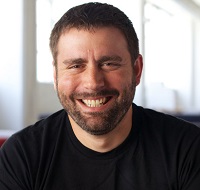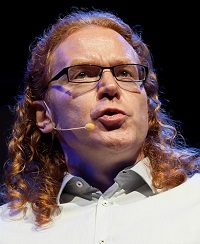Rise of the Developer Evangelist
Developers are a finicky breed apart. They brook no nonsense, suffer no subterfuge and rarely tolerate the non-technical. As they reject many traditional outreach methods from dev tool vendors, they require a new approach. Hence, the rise of the developer evangelist.
"Targeting developers with advertising is not effective," said Josh Marinacci. "It simply doesn't work." Marinacci is a developer evangelist at PubNub, which provides a data stream network API to help customers to connect, scale and manage real-time applications and Internet of Things (IoT) devices.
In light of his observation, you might have noticed developer evangelists are gaining more prominence in the industry, writing blogs, answering questions, coding demos, helping out at hackathons and doing hundreds of other things to spread the word among developers about their company's developer-related products and services.
To explore this expanding and evolving developer niche, I contacted Marinacci and a half-dozen or so of his peers to explore what developer evangelists do, their importance to the industry, their personality traits and what advice they have for coders looking to join the evangelical ranks.
 "It's all about the small wins. It's exciting when you see one of the teams you helped with an integration become massively successful or get tons of press, but it's also really fun and rewarding to spend a weekend at a hackathon, teaching someone who's never built an app before how to make something."
"It's all about the small wins. It's exciting when you see one of the teams you helped with an integration become massively successful or get tons of press, but it's also really fun and rewarding to spend a weekend at a hackathon, teaching someone who's never built an app before how to make something."
Bear Douglas, Twitter
Rob Spectre, a developer evangelist at cloud communications company Twilio, agrees with Marinacci about the special status of developers. "The currency of software developers is respect," he said. "Developers have an increasing influence in every business' enterprise, and if you waste their time with empty promises and marketing, they won't use your products -- and they'll tell their peers about the poor experience."
In fact, it's that failure to separate developer evangelism from marketing that provides one of the biggest challenges to Christian Heilmann, an active writer, presenter and well-known developer evangelist for Microsoft, focusing on the Edge browser. He literally "wrote the book" about developer evangelism.
"Companies tend to think of developer evangelism as a new way of marketing and people who used to do that can easily transition into that role by opening a GitHub account," Heilmann told ADTmag. "They can't. It is a technical role and your 'street cred' in the developer world is something you need to have earned before you can transition. The same way you keep getting compared to developers and measured by comparing how much code you've written."
How Often Do You Code?
In that last sentence, Heilmann was referring to challenges posed by the misunderstanding of the role. That misunderstanding can come from within one's own organization or from the developer target audience. "Developers keep asking you how much you code, assuming you betrayed the cause and run the danger of becoming yet another marketing shill," Heilmann said.
 "The biggest challenge is getting large companies to know that they need evangelism and providing the freedom to do it the right way. To do my job right, I really have to work across the silos. Breaking down internal walls can be tricky, but it is possible."
"The biggest challenge is getting large companies to know that they need evangelism and providing the freedom to do it the right way. To do my job right, I really have to work across the silos. Breaking down internal walls can be tricky, but it is possible."
Josh Marinacci, PubNub
Journalists ask that question too, as I did. The wide range of answers I received speaks to the great diversity of the position.
"Not as much as I'd like," said Marinacci. "Probably 30 percent of the time, though much of that is really research. When a new technology comes out I'll investigate it and decide if it's something we should work with. When I do write pure code, say for a new demo, I end up writing it twice. Once to make sure the basic concept works, then again to produce concise and understandable code for other developers to read."
"As a manager, sadly not that much anymore," said Bear Douglas, developer advocacy manager at Twitter, who calls herself a developer advocate rather than a developer evangelist. "Before being a manager, it was probably 30 percent [of my] time, with the coding I was doing usually in service of trying out new APIs that were in development or creating code samples for docs and presentations. It varied a lot depending on if there was something specific I was working on."
"Once or twice a week I have to do some small amount of coding," said Kurt Collins, director of technology evangelism and partnerships at Built.io, which provides an "Integration-as-a-Service platform."
"Every day," said Twilio's Spectre. "Code is our primary vehicle for inspiring and equipping our peers."
"Every day," echoed Mark Headd, at Accela, which provides civic engagement solutions for government organizations. "If I'm not building a prototype app then I'm working through code provided by one of our developer partners that they might be having an issue with. I also help build some of our client libraries and SDKs. I particularly enjoy writing client libraries and have written several for our platform in different programming languages, as well as for other platforms that I use."
 "I love coding and I love solving business problems. The developer evangelist has to do both. It's one of the few positions where tech and business meet. I've had work experience on both sides of the divide: in engineering and business development. Developer evangelism was a natural progression."
"I love coding and I love solving business problems. The developer evangelist has to do both. It's one of the few positions where tech and business meet. I've had work experience on both sides of the divide: in engineering and business development. Developer evangelism was a natural progression."
Kurt Collins, Built.io
"As often as I can -- lately it's been more often which is great," said Kelly J. Andrews at Syncano, which provides a platform to build serverless apps (connected apps that don't rely on a back-end or server). "On average, I try to code a few hours a week, minimum, to stay in touch with that side of things. Week to week it can vary between 20 percent and 100 percent coding tasks. Just depends on what I'm working on at the time."
Day-to-Day Duties
What Andrews is working on at any certain time could be any of a zillion things, judging from my sample group, who were asked about their day-to-day duties.
"This role is anything but typical -- some days I'm coding, other days I'm recording a video, or I'm shipping boxes to an event," Andrews said. "We are a small organization, so we end up wearing many hats, but my days can include anything from development to documentation and anything in between."
Microsoft is the opposite of a small organization, of course, but Heilmann still has an equally diverse plate full of typical duties, such as:
- Helping product teams write and document good code examples.
- Find, filter, collate and re-distribute relevant news.
- Answer pull requests, triage issues and find new code to re-use and analyze.
- Help phrasing technical responses to problems with our products.
- Keep in contact with influencers and ensure that their requests get answered.
- Coach and mentor colleagues to become better communicators.
- Prepare articles, presentations and demos.
- Conference and travel planning.
"My day is usually spent supporting developers -- directly answering questions or requests for assistance in using our platform," said Headd, at Accela. "I spend a good deal of time building prototype or demo applications to show developers how our platform works and writing up examples for our developer blog. I also work internally with various teams -- marketing, engineering, documentation, etc. -- to make sure that the information and resources we have for developers are up to date and working well. I also travel quite a bit to conferences and events where I meet with developers and talk about our platform."
Twilio's Spectre said: "Developer evangelists inspire and equip their peers both online and offline. Online activities include coding open source projects, writing technical content and documentation and answering questions on Stack Overflow. Offline work includes helping fellow developers at hackathons, speaking at software development conferences and assisting tech meetup organizers in our developer communities."
 "Developers are one of the most discriminating demographics you can find. Their respect takes years to gain and seconds to lose. It's a group that always demands your best work. We need evangelists with the mind of a hacker, the heart of a teacher and the soul of an entrepreneur."
"Developers are one of the most discriminating demographics you can find. Their respect takes years to gain and seconds to lose. It's a group that always demands your best work. We need evangelists with the mind of a hacker, the heart of a teacher and the soul of an entrepreneur."
Rob Spectre, Twilio
"It's a lot of content creation -- writing docs, creating screencasts, sample code, presentations and so on -- and a substantial amount of partner and community support work," said Douglas. "At least one person from our team meets weekly with each engineering team for the platform to give them an update on customer issues and requests and share what we're hearing from people on the ground." She does a lot of work at events, which are prone to seasonality, so her duties vary by the time of year, with more of a focus on online outreach between events such as hackathons, meetups and conferences and -- lately -- the global #helloworld developer tour.
Collins, at Built.io, said: "I talk to a lot of people on a daily basis. Working with enterprise organizations and their representations requires a lot of conversation. In addition to that, I interface with our own development team a fair amount as I am essentially the voice of our partners. As such, I try to make sure our developers know what's going on in the minds of our partners and clients."
Over at PubNub, Marinacci said his schedule varies a lot from day to day. "Some days I'm prepping slides for to present at conferences," he said. "Other days I'm talking to customers about technical or business issues. Sometimes I work on our developer strategy for future products. Sometimes I code up cool new demos. Often I gather input from developers about our products and bring that knowledge back to engineering so that they can make our products and features even better."
Personality Traits
So there's a lot of communication involved with the job. Which doesn't fit in with the stereotypical image of an introverted developer. Which leads us to my next question posed to my group of "devangels," as Twilio refers to them: "What personality traits do you see as being important to being a successful developer evangelist?"
Collins picked up on the communication theme, implying that introversion might not matter that much. "You have to be able to communicate," he said. "I fully believe that inside each one of us is the capability to relate to everyone we meet. Being able to harness that power is key to being a successful developer evangelist. However, equally as important is the ability to analyze tough problems and creative solutions. The end goal of almost any interaction is to figure out a way to add value to both your own organization and the organization you're communicating with. Analysis is vital."
 "I think most developer evangelists are people who enjoy not only finding out about and using new technologies but also showing others how to use it to solve problems. Sooner or later, these kinds of people find their way to a developer evangelist role."
"I think most developer evangelists are people who enjoy not only finding out about and using new technologies but also showing others how to use it to solve problems. Sooner or later, these kinds of people find their way to a developer evangelist role."
Mark Headd, Accela
Andrews implied the introversion aspect may hold some developers back from evangelism. To be successful, he said, evangelists should exhibit "the ability to do more than code -- and more specifically talk to other developers in a personable way. I've met many developers who are absolutely incredible at coding, but aren't comfortable in a very public setting like speaking at a conference or talking to people at a meetup. The role is very much a mixture of marketing and development -- you have to be good at both to survive attending an event."
Douglas succinctly summed up her thoughts: "Enthusiasm, patience and sincerity."
"The job can be overwhelming -- especially when there are so many people who could use your help," she continued. "It's important to keep a close eye on your own burnout, particularly if you travel as well. Most of the people I know need breaks every now and again, but it's the genuine desire to help people and build great things for them that motivates us all through."
"Ultimately you need passion for something," answered Marinacci. "For me it was user experience. For others it might be compilers or databases or networks. If you have the passion, then you can pick up the speaking and writing skills."
Headd said becoming a devangel made him a better speaker and writer, as well as a better developer. "In my experience, developer evangelists are people that like helping others," he said. "They are people that are so excited about technology that they want to share what they have learned with others.
 "I ran into the classic wall we have in IT: I've been a developer for a long time and advanced in my career to lead developer, department lead and architect. In order to advance further, the only path would have been management and discarding development. We seemingly value technical talent above all but we have no career goals to advance to beyond a certain level."
"I ran into the classic wall we have in IT: I've been a developer for a long time and advanced in my career to lead developer, department lead and architect. In order to advance further, the only path would have been management and discarding development. We seemingly value technical talent above all but we have no career goals to advance to beyond a certain level."
Christian Heilmann, Microsoft
"Before I became a professional developer evangelist, I had been writing about different technology platforms for several years, and had already developed client libraries for several different APIs that I used regularly," continued the Accela devangel. "I was active in developer forums and enjoyed helping people work through problems with solutions they were developing. I liked creating open source software that I could share with others and was a frequent participant in app challenges and hackathons."
Communication was, again, the first thing that came to mind to Heilmann. "You need to be a good communicator," said the London-based Microsoft evangelist. "You need to not be arrogant and sure that you and only you can build great things but instead know how to inspire people to work with you and let them take the credit. You need to have a lot of patience and a thick skin.
"You will get a lot of attacks and you will have to work with misunderstandings and prejudices a lot of times," Heilmann continued. "And you need to be flexible. Things will not always go the way you want to, and you simply can not be publicly grumpy about this. Above all, it is important to be honest and kind. You can't get away with lies, and whilst bad-mouthing the competition will get you immediate results it will tarnish your reputation quickly and burn bridges."
 "Proving value is one of the hardest challenges -- because most of what we do has no tracking code. You have to be able to talk about what you have done, and maybe you can use some links with a campaign code associated, but for the most part, it shows up in ways that don't directly relate to the evangelist. Most organizations feel it's a needed resource -- but if they are looking for a direct result to prove ROI, its hard to find it."
"Proving value is one of the hardest challenges -- because most of what we do has no tracking code. You have to be able to talk about what you have done, and maybe you can use some links with a campaign code associated, but for the most part, it shows up in ways that don't directly relate to the evangelist. Most organizations feel it's a needed resource -- but if they are looking for a direct result to prove ROI, its hard to find it."
Kelly Andrews, Syncano
Spectre didn't have much to say about introversion or personality traits, but did weigh in on the technical chops needed.
"Technical versatility is definitely more demanding now than it was five years ago," the Twilio devangel said. "Programming on the Internet continues to balloon in complexity: stylesheet preprocessors, transpiled languages like CoffeeScript and TypeScript, new languages like Go, Rust and Elixir and dramatic changes in client-side MVCs like Angular, Ember and React.
"The Web went from an already-complicated stack to an absurdly convoluted house of cards," Spectre continued. "And that is to say nothing of the vast complexity of mobile development with multiple languages, versions and toolchains for iOS and Android. It used to be a developer evangelist could get by on being conversant in a single Web scripting language -- those days are solidly in the rear view."
Reasons for the Rise
What isn't in the rear view is any notion that devangels aren't important to modern developer-related companies.
"Historically, this role has been a platform vendor role," IDC analyst Al Hilwa told ADTmag. "Typically, when a company creates a new platform, one that requires bringing developers up to speed to create an ecosystem of apps that run on the platform, then they create a developer evangelism team.
"The terminology goes way back to the birth of the PC when building applications outside of corporate mainframe systems started becoming a possibility," Hilwa continued. "Companies like Apple and Microsoft likely had the first such teams that were labeled 'Developer Evangelism.' From a skill-set perspective, these folks were effectively developers themselves and understood the vendor technology.
 "Companies like Apple and Microsoft likely had the first such teams that were labeled 'Developer Evangelism.' From a skill-set perspective, these folks were effectively developers themselves and understood the vendor technology. From a workload perspective, the operated like on-sight consulting staff, though they are typically compensated internally based on the vendor reaching adoption metrics, rather than on a billable-hours basis like a consultant. Other than that, they often worked on projects hands-on, at one or more companies, and typically worked with early releases of products."
"Companies like Apple and Microsoft likely had the first such teams that were labeled 'Developer Evangelism.' From a skill-set perspective, these folks were effectively developers themselves and understood the vendor technology. From a workload perspective, the operated like on-sight consulting staff, though they are typically compensated internally based on the vendor reaching adoption metrics, rather than on a billable-hours basis like a consultant. Other than that, they often worked on projects hands-on, at one or more companies, and typically worked with early releases of products."
Al Hilwa, IDC
"The important point," the IDC analyst continued, "is that in this age of digital transformation where APIs to internal systems are exposed for mobile, IoT, Web or any kind of customer engagement access, the role is becoming much broader and many more companies are building such teams to attract developers and apps to their APIs."
The main benefit to those companies, Heilmann said, is developer retention and acquisition.
Headd picked up on the API theme mentioned by Hilwa. "If an enterprise has an externally available API, or is thinking about launching one, then they should consider how people will find out about it and learn to use it. Depending on how complex an API is -- or the functions that the API supports -- there may be a need to task specific people with assisting developers and providing support."
Spectre said that devangels connect with developers by meeting them in their own court. "Developer evangelism can fill the void created by traditional 'developer marketing' by respecting developers' time and effort," he said.
Marinacci put it more bluntly: "If you have developers as customers then you can't succeed without at least one developer evangelist on staff."
"Mindshare is probably the biggest thing companies hope to get out of it," Douglas said.
So You Want To Become a Developer Evangelist?
Finally, I asked the devangels what advice they have for devs interested in adding the title to their résumés. Here's what they said:
Andrews: "Do it. Be prepared for a wild, exhausting ride. Don't plan on doing it forever, but if you want to learn how to help others learn, and talk to a ton of people -- go for it."
Heilmann: "Start by documenting your work and writing about it. Then get up to speed on your presenting skills. You do that by repetition and by not being afraid of failure. We all hate public speaking, and it is important to get past that fear. Mingle, go to meetups and events and analyze talks and articles of others and see what works for you and is easy for you to repeat and reflect upon. Excitement is the most important part of the job. If you're not interested, you can't inspire others."
Headd: "Start writing and speaking about the technology you love, and showing others what you are doing with it. Being able to tell your story clearly and succinctly is an important trait of good developer evangelists. Some companies will feature developer stories on their sites and may even let you write a guest blog post about how you are using their platform. My first job as a developer evangelist came about largely because I was an active blogger and perceived expert on several different communication platforms," Headd continued. "There is no downside to being able to write and speak clearly about the technology that you are passionate about -- and it might even get you a job."
Spectre: "Focus on your technical skills. Aspiring developer evangelists need to be exceedingly b in their software development foundational knowledge, including algorithms, web and mobile platforms and data structures. Once your peers respect your technical abilities you can start writing tutorials for your favorite programming languages. Get involved in your local developer communities via tech meetups and when you're comfortable that you know a topic well, give a talk.
Collins: "Spend some time in your career being a software engineer. If you haven't been on the front lines doing code commits, then you're missing a huge part of the developer experience. That's a requirement when you're speaking to developers; having walked a mile in their shoes will help you get far."
Douglas: "Get involved in open source communities. All of them can use help in the core of what advocacy is all about -- helping other people be successful with the platform or framework. Write a blog post, host a meetup, contribute some docs -- it's a way to dip your toe in the water that also helps people out immediately."
Marinacci: "Write and speak about what you like to anyone who will listen. Learn from anyone who will teach you. Give a talk on something cool at a local meet up. Just go do it."
If you do just go do it -- and you live in San Francisco -- you might just be looking at a salary of $153,000, according to careers site Indeed.com, which pegs the average nationwide salary at $112,000. And there appear to be plenty of opportunities to break into the profession, with some 1,700 jobs listed on LinkedIn.com.
On the rise and there for the taking. Why not just do it?
What experiences have you had either being a developer evangelist or working with one? Comment here or drop me a line.
Posted by David Ramel on February 18, 2016